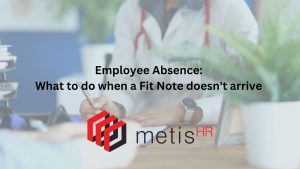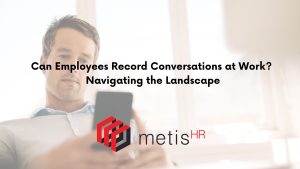
What To Do When a Fit Note Doesn’t Arrive.
Do you know what to do when a fit note doesn’t arrive from you employee? At Metis HR we get asked this question a lot!
Articles

Do you know what to do when a fit note doesn’t arrive from you employee? At Metis HR we get asked this question a lot!

When you have been left covering the work of someone who has phoned in sick, it quickly focuses your mind as to the importance of

In the modern workplace, where technology connects with business operations, questions about privacy, legality, and employee rights often arise. One such question is can employees

Believe it or not in the last three weeks we’ve had four calls asking us can I stop an employee looking after their children during

The Covid-19 pandemic significantly shifted attitudes and expectations around remote working and, as a result, an increasing number of people now work remotely some or

Why do clients use Metis HR? Metis HR is a well-regarded HR service provider based in Rossendale known for its expertise and comprehensive range of

Salon owners experience a unique set of HR concerns specific to the hair and beauty industry, in addition to the more general HR issues that

Family businesses are tricky things at the best of times. Running a business in itself is hard, without throwing in the added complication of familial

Last month, an increased national minimum wage was introduced across the nation. So of course, every company that uses the national minimum wage as the

In March 2022 the government told us that living with covid 19 is now necessary and that the covid restrictions were over. What does that
Categories
Copyright © 2020 Metis HR Ltd. Registered Company No: 07554123. All Rights Reserved
Website by Thomas Cole Digital